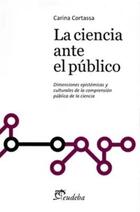Is it feasible for scientists and the public to communicate intelligently? Why is it necessary for people, political authorities, judges, the media, to be able to notice the distance between maintaining that "in the light of the available evidence the risk of an earthquake has not increased" and stating that "there is no risk at all"? What responsibility does the expert community have in this process? These are the kinds of questions addressed in this book, which examines the possibilities of a reasonable dialogue between science and society, which tends to favor the circulation and social appropriation of knowledge.
All book titles by this author
|
Title |
Price | ||
|---|---|---|---|
|
|
Ciencia ante el Público, La Author: Carina Cortassa Publisher: Eudeba |
$390.00 |
Shopping cart
Loading cart
Important notices
|
|
Recordando a André Rouillé: Su legado en la fotografía André Rouillé 1948 - 2025 |
|
|
Libros de filosofía y co. Disponibles en Librería Herder |
|
|
Revista Filosofía & Co. nº 9 Nueva revista de filosofia divulgativa y actualidad |
|
|
"Espacios de la filosofía" - Mauricio Beuchot - Novedad Herder México |
|
|
Revista Filosofía & Co. nº 8 Nueva revista de filosofia divulgativa y actualidad |
Pay safely with:


In the webshop
New
|
|
Contra el Arte 70458 $610.00 -25.00% $457.50 |
|
|
Medios calientes 70159 $400.00 -0.00% $400.00 |
|
|
En busca del español correcto 70074 $400.00 -0.00% $400.00 |
|
|
Regresar afuera 70148 $275.00 -0.00% $275.00 |
|
|
Simone de Beauvoir 70149 $230.00 -0.00% $230.00 |
In the press
Promotions
|
|
Panorama A1.1, Deutsch als Fremdsprache Übungsbuch 36726 $235.00 -35.00% $152.75 |
|
|
Diccionario de términos filológicos 70241 $900.00 -25.00% $675.00 |
|
|
Prosa y poesía. Homenaje a Gonzalo Sobeja 70242 $1,755.00 -25.00% $1,316.25 |
|
|
Lingüística española aplicada a la terapia del lenguaje 70239 $300.00 -25.00% $225.00 |
|
|
Introducción a la filosofía 70243 $620.00 -25.00% $465.00 |







